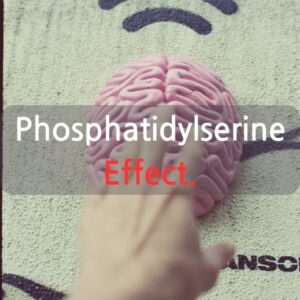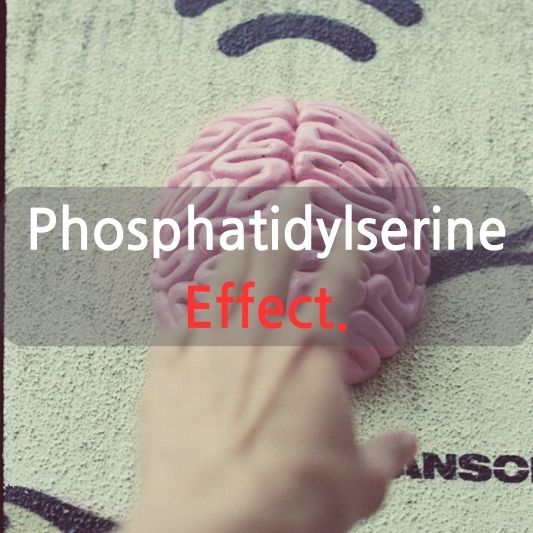The world of brain health and cognitive enhancement is continually evolving, with an array of supplements claiming to boost mental acuity and fortify the brain against age-related decline. Among these, Phosphatidylserine has gained attention for its purported benefits in supporting brain function.

Introduction to Phosphatidylserine
What is Phosphatidylserine?
Phosphatidylserine is a phospholipid found in high concentrations within the brain. It plays a crucial role in the structure and function of brain cells, aiding in neurotransmission and maintaining cellular health.
Importance of Phosphatidylserine for Brain Health
Research suggests that Phosphatidylserine is involved in various brain functions, such as memory formation, concentration, and overall cognitive performance.
Functions and Benefits of Phosphatidylserine
Memory Enhancement
Studies indicate that Phosphatidylserine supplementation may enhance memory and cognitive abilities, particularly in individuals experiencing age-related cognitive decline.
Stress Reduction
Phosphatidylserine has shown promise in mitigating stress and supporting adrenal health, potentially reducing the impact of cortisol, the stress hormone, on the brain.
Cognitive Function Improvement
Individuals supplementing with Phosphatidylserine have reported improvements in focus, attention span, and overall mental clarity.
Food Sources of Phosphatidylserine
Natural Sources of Phosphatidylserine
While primarily found in the brain, Phosphatidylserine is also present in small amounts in various foods such as soybeans and certain meats.
Dietary Sources Rich in Phosphatidylserine
Certain dietary choices, including incorporating more fish and organ meats into one’s diet, can contribute to increased Phosphatidylserine intake.
Supplements and Dosage
Phosphatidylserine Supplements
Supplements are available for those seeking a concentrated form of Phosphatidylserine, often derived from soy or other sources.
Recommended Dosage
Health experts typically recommend specific dosages for Phosphatidylserine supplements to optimize its cognitive benefits.
Research and Studies
Scientific investigations into Phosphatidylserine have yielded promising results, showcasing its potential in supporting brain health and function across various demographics.
Safety and Side Effects
While generally considered safe, some individuals may experience mild side effects like insomnia or stomach upset. Consulting a healthcare professional before supplementation is advisable.
Usage and Application
Incorporating Phosphatidylserine into one’s daily routine can be seamless, with supplements readily available in various forms like capsules or powders.
Phosphatidylserine in Various Age Groups
Benefits for Different Age Groups
The benefits of Phosphatidylserine may vary across different age brackets, offering unique advantages to both younger individuals and older adults.
Impact on Aging
Some research suggests that Phosphatidylserine supplementation might help mitigate age-related cognitive decline, potentially improving brain health in older adults.
Comparison with Other Brain Supplements
Contrasting Phosphatidylserine with other brain health supplements highlights its unique role and benefits in cognitive enhancement.
Expert Recommendations and Insights
Health practitioners and experts often recommend Phosphatidylserine as part of a comprehensive approach to brain health, emphasizing its potential benefits.
Real-life Experiences and Testimonials
Personal anecdotes and testimonials from individuals using Phosphatidylserine can provide valuable insights into its effects and user experiences.
Future Prospects and Trends
The future of Phosphatidylserine research holds promise, with ongoing studies exploring its extended applications and potential advancements.
Food Sources of Phosphatidylserine
Natural Sources of Phosphatidylserine
Phosphatidylserine is naturally present in various foods, albeit in relatively small amounts compared to supplements. Some natural sources include:
- Organ Meats: Organ meats like liver and kidney contain moderate levels of Phosphatidylserine.
- Meat and Poultry: Chicken, turkey, and beef also contain traces of this phospholipid.
- Fish: Certain types of fish, including mackerel and herring, are known to contain Phosphatidylserine.
Dietary Sources Rich in Phosphatidylserine
While it’s challenging to get significant amounts of Phosphatidylserine from food alone due to its limited presence, incorporating these items into your diet may contribute to overall intake:
- Soy Products: Soy lecithin, derived from soybeans, is a common source of Phosphatidylserine.
- White Beans: Some legumes, such as white beans, also contain this phospholipid.
- Egg Yolks: Egg yolks have trace amounts of Phosphatidylserine.
These dietary sources might not provide concentrated levels of Phosphatidylserine compared to supplements but can be part of a balanced diet contributing to overall nutrient intake.
Conclusion
In conclusion, Phosphatidylserine stands as a compelling supplement for nurturing brain health and cognitive function. Its multifaceted benefits, from memory enhancement to stress reduction, position it as a valuable asset in maintaining mental acuity.
FAQs
1. Can Phosphatidylserine help with ADHD symptoms?
Phosphatidylserine supplementation may offer some support for individuals with ADHD, potentially aiding in improved focus and attention.
2. Is Phosphatidylserine safe for long-term use?
While generally safe, extended use should be discussed with a healthcare professional to monitor any potential interactions or side effects.
3. What is the recommended dosage of Phosphatidylserine for older adults?
Experts suggest specific dosages tailored to the individual’s age and health condition; hence, consulting a healthcare provider is advisable.
4. Can Phosphatidylserine improve overall cognitive function in healthy individuals?
Research suggests that Phosphatidylserine might have positive effects on cognitive function, even in individuals without existing cognitive impairments.
To Find Out What Phosphatidylserine Price Is On iHub.
